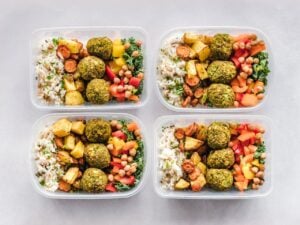Sustainably Sourced Meat: Your Guide To Responsible Eating

As the world population continues to grow, the demand for meat is increasing. The way meat is currently produced is not sustainable and is having a negative impact on the environment. Sustainably sourced meat is meat that is produced in a way that is compatible with the environment and does not put the future of our food supply at risk.
What Is Sustainable Meat?
It is no secret that the phrase ‘sustainable’ meat is thrown around each and every other way nowadays. But many still ask the question: “What is sustainable meat?”
Sustainably sourced meat comes from animals that are raised in accordance with humane animal welfare standards and environmental best practices and is an important part of responsible meat production.
The goal of sustainable sourcing is to create a closed-loop system in which the animals are raised in a way that does not damage the environment or deplete natural resources.
Animals raised for sustainable meat production are typically fed a diet of pasture-raised grasses and forage. They are allowed to roam freely and are not confined to small spaces. This results in a more natural and stress-free life for the animal, which leads to healthier meat.
Look For These Labels When Buying Meat
The way our meat is raised and slaughtered has a huge impact on the environment. For instance, a study performed by the Animal Frontiers journal and the American Society of Animal Sciences found that the livestock industry is responsible for 18 percent of greenhouse gas emissions. That is more than the entire transportation sector! It’s also a leading cause of water pollution and deforestation.
However, there are a few labels you can keep an eye out for when looking to purchase sustainably-sourced meat products, which you can read more about below.
Grass-Fed
This label means the animals were fed a diet of grass, rather than grain. Grassfed meat is lower in fat and calories and higher in omega-3 fatty acids than grain-fed meat.
Additionally, the freedom granted to grass-fed animals–as opposed to conventionally farmed chickens and cows–spells healthier and happier lives, translating into better quality and more sustainably-sourced meat.
Certified Humane
This label means the animals were raised and slaughtered in a humane way, and all sustainably-sourced meat meets the Animal Care Standards (ACS).
USDA Organic
This label means that the meat contained in that package is sustainably sourced, and the animals were raised and fed without the use of synthetic pesticides, herbicides, or fertilizers.
Free-Range
Free-range meat is a type of meat that comes from animals that are allowed to roam freely and are not confined to small spaces.
This type of meat is usually more expensive than meat from animals that are raised in factory farms, but many people believe that it is more humane and that the animals have a better quality of life.
How Eating Less Meat Helps the Environment
If you’re wondering how eating less meat helps the environment, keep in mind that producing meat requires factories, farms, gas emissions, and many other factors that can damage our planet.
Our World In Data found that the average person in the United States eats over 200 pounds of meat every year, which is more than double the global average of just over 90 pounds.
The environmental effects of meat production on our planet cannot go understated. Eating less meat is one of the easiest and most effective things you can do to reduce your impact on the planet. The growing and raising of animals for food is responsible for a huge amount of environmental damage.
Further, animal agriculture is a leading cause of deforestation, water pollution, and species extinction. It’s also one of the leading sources of greenhouse gas emissions.
In short, reducing meat consumption is vital to protecting our environment and ensuring a livable planet for future generations.
Speaking of eating less meat, plant-based protein can be a fantastic alternative to meat products in general–even sustainably sourced meat!
Unfortunately, many are skeptical of plant-based protein due to a lack of understanding and knowledge surrounding the industry, and the aversion to eating what some consider to be a ‘fake product.’
If you’d like to limit the environmental effects of meat production in your own way, an option is to consider adding more plant-based protein to your diet. Be sure to check out our our comprehensive plant-based protein guide for more information!
How You Can Start Eating More Sustainably Sourced Meat
If you’re interested in eating more sustainably sourced meat, there are a few things you can do to make sure the meat you’re eating is coming from ethical and sustainable sources.
First, try to buy meat from local farmers who raise their animals in humane conditions. You can also look for meat that has been certified by organizations like the Global Animal Partnership or Animal Welfare Approved.
Finally, make an effort to eat less meat overall, and choose higher quality cuts when you do eat it. By following these guidelines, you can start eating more sustainably sourced meat and doing your part to support the humane treatment of animals.
If you are interested in healthy, affordable, sustainably-sourced meat and seafood products delivered right to your door, don’t forget to check out our Classic Plan or our Lean & Clean Plan.
Eat Pasture-Raised Meats
Pasture-raised meat is a healthier and more sustainable option than meat from conventionally-raised animals.
Animals raised in this way are allowed to roam and graze on grass and other plants, resulting in meat that is lower in fat and calories and higher in nutrients like omega-3 fatty acids and vitamins A and E.
Pasture-raised meat is also more humanely produced, as the animals are not confined to cramped, unhealthy conditions.
The more pasture-raised and sustainably-raised meat you consume, the
Pick The Most Sustainable Meats
If you’re looking to add more sustainable meats to your diet and learn how eating less meat helps the environment, there are a few key points you should consider.
First, think about the animal’s diet. Grass-fed cows, for example, have a more sustainable diet than grain-fed cows.
Second, consider how the animal was raised. Animals that are free-range and humanely raised are more sustainable than those that are not.
Finally, think about the impact of the animal’s meat on the environment: animals that have a lower impact on the environment, such as chickens, are more sustainable than those that have a higher impact, such as cows.
When you’re ready to choose a sustainable meat, pick the one that best meets your needs. Also, if you’re interested in purchasing sustainably-sourced meat for use in any of your recipes, you can check out our guide on How To Choose The Best Protein Source For Your Recipe.
Seek Out Sustainable Seafood
If you love seafood, you’re not alone. But with seafood consumption on the rise, it’s more important than ever to seek out sustainable seafood.
Sustainable seafood is seafood that is caught or farmed in a way that does not damage the environment or jeopardize the long-term health of fish populations. When done right, sustainable seafood can be a delicious and nutritious part of a healthy diet.
To find sustainable seafood, look for the Marine Stewardship Council (MSC) blue fish label.
The MSC is an independent, nonprofit organization that certifies sustainable seafood. When you see the MSC blue fish label, you can be confident that the seafood you’re eating meets the highest standards for sustainability.
You can also check the Monterey Bay Aquarium Seafood Watch program for the latest information on which seafood items are sustainable and which to avoid. With a little effort, you can enjoy delicious seafood while helping to protect our oceans for future generations.
Gobble’s Meal Kits Puts Sustainability First
At Gobble, our meal-kit delivery service is committed to sourcing only the finest sustainable meat products. All wild-caught seafood that is sold through Gobble is also Marine Stewardship Council (MSC) certified, meaning that seafood is both sustainably-caught and sustainably farmed.
For non-wild-caught seafood, in-house farming programs follow the Best Aquaculture Practices (BAP) list of requirements and best practices to ensure that sustainability requirements are always met.
Additionally, all salmon products are Good Agricultural Practices (GAP) certified and are never raised with any antibiotics or genetically-modified organisms (GMOs).
If you would like more information on Gobble’s sustainable farming practices, make sure to check out our Animal Welfare Policy for additional information.
Prioritize Sustainable and Delicious Meat
As the world population continues to grow, it is important to find sustainable and delicious sources of meat.
The World Health Organization recommends that people eat less meat, particularly red meat, to improve their health and reduce their risk of chronic diseases.
However, many people continue to consume large amounts of meat, often without considering the environmental and health impacts.
There are a number of delicious and sustainable meat options available, from grass-fed beef to free-range chicken. By choosing these options, we can reduce our impact on the environment and improve our health at the same time.
Try Gobble Today!
For more information on how Gobble meal kit plans work, make sure to read our informational page on How It Works.
Don’t waste any more time! if you’re in the mood for supporting the environment, ensuring the welfare of animals–all while eating delicious, sustainably-sourced meat.



